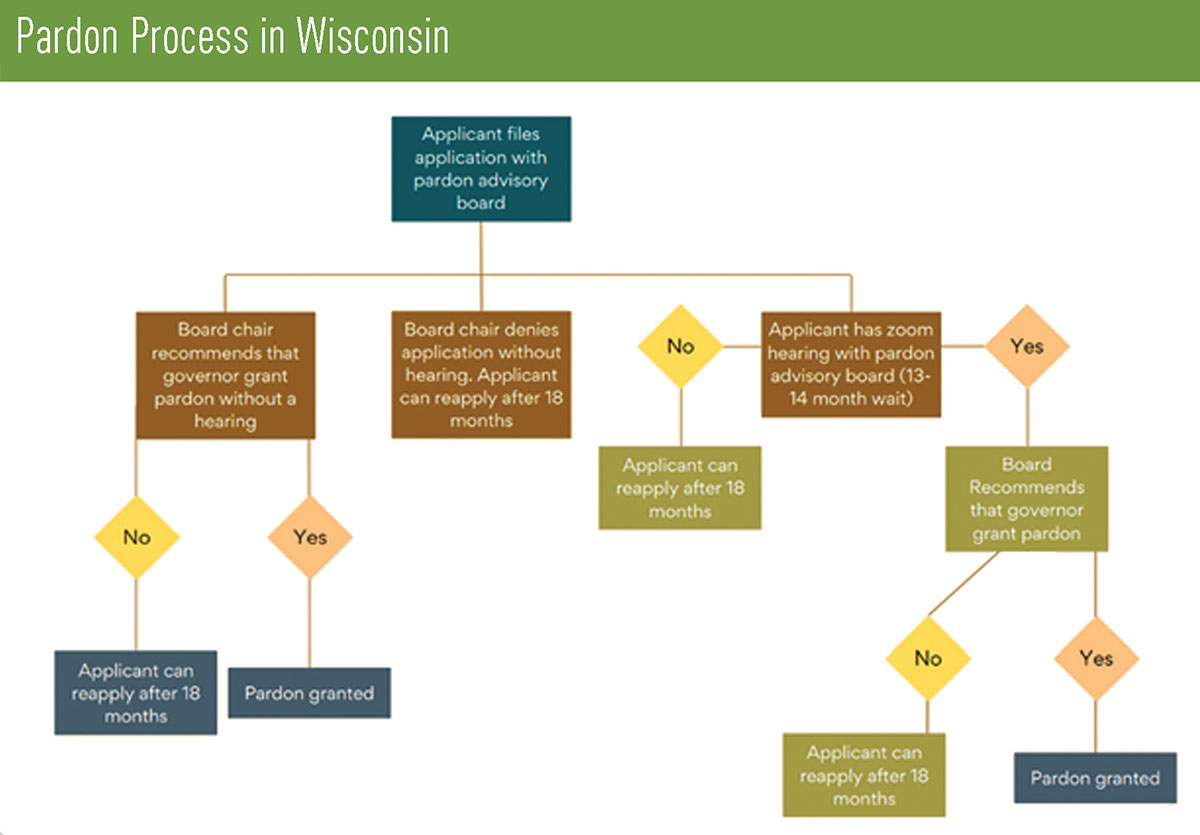
The pardon power is an important safeguard to encourage positive life changes, correct systemic injustices, and mitigate unreasonably harsh punishment.1 A pardon relieves an offender of some of the collateral consequences of a criminal conviction by restoring the individual’s rights that were lost because of that conviction.2 However, as the “tough on crime” movement gained prominence, there was a notable decrease in the issuance of pardons.3
Wisconsin serves as a fitting illustration of this trend. In Wisconsin, the pardon power rests solely with the governor.4 Historically, Wisconsin governors regularly exercised this authority,5 but there was a hiatus during Governor Scott Walker’s administration. During his eight years in office, Walker did not issue any pardons.6 However, there has been a significant revival of pardons under Governor Tony Evers. Since taking office, Evers has granted more than 1,100 pardons.
With this change, attorneys have an important role to play in restoring rights and mitigating the long-term effects of criminal records for deserving candidates. This article sheds light on the pardon process in Wisconsin, offering insights into its workings and highlighting the transformative potential it provides for Wisconsinites.
The Pardon Power: An Overview
The concept of the pardon dates back to the inception of centralized political power.7 It is a practice found across all cultures and throughout every era of history.8 In the United States, the pardon power was derived from the power held by the English crown. At common law, the king had the power to “forgiveth any crime, offence, punishment, execution, right, title, debt, or duty.”9 This power was nearly unrestricted, and “the king frequently used pardons as partisan indulgences for friends and supporters.”10
 Taylor Forman, Marquette 2023, is a staff attorney at the Legal Aid Society of Milwaukee’s Health & Wealth Team and focuses on providing legal assistance to qualifying Milwaukee County residents in estate planning, record clearing, and Social Security disability appeals. As a law student, she volunteered at several legal clinics offered by the Milwaukee Volunteer Legal Clinics and had internships with Disability Rights Wisconsin, Legal Action of Wisconsin, and the Legal Aid Society of Milwaukee.
Taylor Forman, Marquette 2023, is a staff attorney at the Legal Aid Society of Milwaukee’s Health & Wealth Team and focuses on providing legal assistance to qualifying Milwaukee County residents in estate planning, record clearing, and Social Security disability appeals. As a law student, she volunteered at several legal clinics offered by the Milwaukee Volunteer Legal Clinics and had internships with Disability Rights Wisconsin, Legal Action of Wisconsin, and the Legal Aid Society of Milwaukee.
 Benjamin D. Edelstein, Marquette 2022, is a staff attorney with Legal Action of Wisconsin, where he focuses on helping low-income individuals overcome employment barriers through the Road to Opportunity and Municipal Court Defense projects. He serves on the State Bar of Wisconsin’s Wisconsin Lawyers Assistance Program (WisLAP) Committee and the Communication and Education Subcommittee of the Diversity and Inclusion Oversight Committee.
Benjamin D. Edelstein, Marquette 2022, is a staff attorney with Legal Action of Wisconsin, where he focuses on helping low-income individuals overcome employment barriers through the Road to Opportunity and Municipal Court Defense projects. He serves on the State Bar of Wisconsin’s Wisconsin Lawyers Assistance Program (WisLAP) Committee and the Communication and Education Subcommittee of the Diversity and Inclusion Oversight Committee.
 Megan L. Sprecher, Univ. of St. Thomas School of Law 2007, is a supervising attorney with Legal Action of Wisconsin, where she oversees the Student Legal Aid project and Urban League of Greater Madison Expungement Clinics, both of which focus on removing barriers to employment for low-income Wisconsinites. She is a coauthor of the “Domestic Abuse” chapter of the Wisconsin Attorney’s Desk Reference and the “Representing Youth with Mental Health Issues” chapter of Mental Health Law in Wisconsin: A Guide for Legal and Healthcare Professionals. She serves on the Committee to Improve Interpreting and Translation in the Wisconsin Courts.
Megan L. Sprecher, Univ. of St. Thomas School of Law 2007, is a supervising attorney with Legal Action of Wisconsin, where she oversees the Student Legal Aid project and Urban League of Greater Madison Expungement Clinics, both of which focus on removing barriers to employment for low-income Wisconsinites. She is a coauthor of the “Domestic Abuse” chapter of the Wisconsin Attorney’s Desk Reference and the “Representing Youth with Mental Health Issues” chapter of Mental Health Law in Wisconsin: A Guide for Legal and Healthcare Professionals. She serves on the Committee to Improve Interpreting and Translation in the Wisconsin Courts.
Aware of the previous misuses, the framers of the U.S. Constitution still endowed the president with a broad pardon power.11 Article II, section 2 of the U.S. Constitution gives the president the power to “grant Reprieves and Pardons for Offenses against the United States except in cases of Impeachment.” The presidential pardon power is unique because it is not subject to judicial or legislative oversight.12 As the U.S. Supreme Court explained:
“The power thus conferred is unlimited, with the exception [for impeachment] stated. It extends to every offense known to the law, and may be exercised at any time after its commission, either before legal proceedings are taken, or during their pendency, or after conviction and judgment. This power of the President is not subject to legislative control. Congress can neither limit the effect of his pardon, nor exclude from its exercise any class of offenders. The benign prerogative of mercy reposed in him cannot be fettered by any legislative restrictions.”13
Although the exercise of the presidential pardon power has raised concerns throughout U.S. history, proposals to limit its scope have failed to gain traction.14 The president’s clemency power only extends to offenses against the United States, meaning the president has no authority to pardon state crimes.15 Although not mandated by the U.S. Constitution, every state has established a pardon power.16 Historically, governors regularly used their pardon power, but in recent decades, they have been more reluctant to issue pardons.17
This shift coincided with the emergence of the “tough on crime” movement.18 Governors often face criticism in election campaigns for using pardons and other forms of clemency,19 with some contending that political pressure skews their judgment.20 Others, like then-Governor Walker, argued that courts should decide.21 Walker explained: “The only people seeking pardons are people who are guilty and I don’t have any reason to undermine the criminal justice system.”22
In contrast, many other people view the pardon as an essential safety valve in the criminal justice system.23 “Clemency, properly exercised and freed of political pressures, represents an ideal vehicle for remedying many of the problems inherent in an imperfect, overloaded, and increasingly rigid system of criminal justice.”24 Furthermore, as Governor Evers has stated, “[p]ardoning an individual is a big step to allowing them to move on in their lives and continue to study, work, and contribute to their communities.”25
Models of Pardon Administration
As stated above, every state has established a pardon power.26 Unlike the federal government, states have experimented with constraints on exercising this power. Therefore, the use of the pardon power differs from state to state.
In some states, the authority to grant pardons is primarily exercised by an administrative board, separate from the governor.27 These independent pardon boards operate under strict procedural guidelines and carry out the majority of their operations in public.28 In other states, administrative boards share the power to grant pardons with the governor.29 In these setups, some states mandate that the governor receive a pardon recommendation from the board before taking action; in others, the governor can, but need not,seek guidance from the board.
In states like Wisconsin, the pardon power lies exclusively with the governor under a nonstatutory advisory system.Article V, section 6 of the Wisconsin Constitution grants the governor the exclusive authority to grant pardons, except in cases of treason and impeachment.30 However, the Wisconsin Legislature has some supervisory authority. The governor must make periodic reports to the legislature on all pardons and other acts of clemency.31 Furthermore, the legislature can regulate the “manner of applying for pardons.”32 The governor generally appoints a nonstatutory pardon advisory board to reduce the administrative burden.33
Pardons Issued in Wisconsin Since 1965
Warren P. Knowles – 99 Patrick J. Lucey – 394 Martin J. Schreiber – 57 Lee S. Dreyfus – 111 Anthony S. Earl – 196 | | Tommy G. Thompson – 202 Scott McCallum – 24 Jim Doyle – 326 Scott Walker – 0 Tony Evers – 933 (through April 2023) |
Source: Jillian Slaight, Legis. Reference Bureau, Executive Clemency Power in Wisconsin (May 2023).
The Impact of Pardons in Wisconsin
Pardons provide additional chances for individuals who have demonstrated a commitment to being lawful and outstanding members of society since their release. After a person’s sentence is served, some lost civil rights, such as the right to vote, are automatically restored.34 However, some repercussions of a felony conviction persist long after a sentence concludes. A pardon provides a means to eliminate these ongoing penalties.
Pardons hold monetary and symbolic powers for individuals, their families, and their communities, as they recognize the progress that the individual has made.35 In Wisconsin, a pardon is significant because it is the sole mechanism that restores certain civil rights.
The right to hold public office can only be restored by a governor’s pardon. This includes appearing on an electoral ballot, becoming a notary public, or holding “any office of trust, profit, or honor in [Wisconsin].”36 The absence of this right precludes individuals from serving in roles such as sheriff, deputy sheriff, patrol officer, police officer, or constable.37
The right to own a firearm and possess body armor can only be restored by a governor’s pardon.38 This affects an individual’s ability to work in certain professions and participation in hunting activities, which holds significant cultural importance for many Wisconsinites.
The freedom to travelcan also be indirectly affected, especially regarding traveling abroad. A handful of countries, including Canada,39 Australia,40 and Japan,41 can deny entry to U.S. citizens who have a felony record. Furthermore, because a felony conviction can disqualify a person from obtaining a travel visa, the right to travel is further infringed upon.42 Such travel restrictions have repercussions beyond limiting vacation options; an inability to travel can restrict job opportunities in certain industries.
A pardon can also help individuals regain access to public benefits that were lost due to a conviction. For instance, a felony conviction creates barriers to securing private and public rental housing.43 In Milwaukee, the public housing authority has eligibility requirements for admission, along with discretionary screening that includes considerations of criminal history.44 These criteria are used to determine which applicants will be admitted to public housing.A pardon can significantly improve a person’s chances of moving off the waiting list and securing affordable housing.
Additionally, a pardon allows individuals with convictions to access a broader range of employment opportunities.45 Restricted job opportunities can lead to reduced income, pushing those attempting to reintegrate into society toward poverty. Many positions in education, health care, and law enforcement automatically bar individuals with felony convictions.46 In addition, hundreds of licensed professions are potentially out of bounds for a person with a felony conviction due to the discretion vested in professional licensing boards.47 Moreover, careers such as barbering, cosmetology, midwifery, pharmaceutical distribution, nursing, home inspection, land surveying, real estate brokerage, and others can be affected by a felony conviction.
Even after a person secures licensure, having a conviction can hinder the person’s ability to perform the full range of duties for jobs that require entering homes and businesses to perform the work. Studies have shown that the estimated earning loss associated with a felony record is around $6,400 annually, making pardons life-changing opportunities.48
Felony Convictions and Employment Opportunities in Wisconsin*
*Lists are representative, not exhaustive.
Current Process and Criteria
Under the current pardon-eligibility criteria, a person is eligible to apply for a pardon if all the following are true:
The person is seeking a pardon for a Wisconsin felony conviction.
It has been at least five years since the person finished any criminal sentence. This means the person completed all confinement and all supervised release (for example, probation, parole, or extended supervision).
The person does not have any pending criminal cases or charges in any jurisdiction.
The person is not currently required to register as a sex offender.52
Governor Evers created a pardon board, the members of which vet applications and hold virtual hearings for applicants. The board chair has the discretion to reject applications and to send applications directly to Evers for review, bypassing the hearing stage. This typically happens for old nonviolent convictions. Most applicants go through the hearing process.

Board Makeup
The current pardon board has members from diverse backgrounds, professions, and geographic regions within the state. Among them is someone with personal experience with the pardon process: Anthony Cooper Sr., who is active in the Dane County community and received a gubernatorial pardon in 2021.53 Governor Evers’ chief legal counsel acts as chair of the board.54 Reviewing the list of pardon board members and encouraging potential applicants to watch recorded pardon hearings on the board’s YouTube channel can help individuals become more acquainted and comfortable with the process.
Wisconsin’s Current Pardon Board Members
Chair – Atty. Mel Barnes, Chief Legal Counsel for Gov. Evers
Anthony Cooper Sr., CEO and president, Focused Interruption
Rev. Jerry Hancock, retired attorney, Prison Ministry Project director
Hon. Jeffrey Kremers, retired circuit court judge
Rev. John McVicker Sr., pastor, Christ the King Baptist Church
Cindy O’Donnell, retired deputy secretary, Department of Corrections
Atty. Nadya Perez-Reyes, assistant secretary, Wisconsin Department of Children and Families
Myrena Warrington, director of vocational rehabilitation, Menominee Nation
Noble Wray, retired police chief
Considerations When Pardon Applications Are Being Reviewed
The pardon board, board chair, and governor all have much discretion in the pardon process and can consider criteria beyond the basic eligibility requirements. Common topics that come up at hearings that are considered in vetting pardon applicants include:
The nature and circumstances of the applicant’s conviction(s) (nonviolent crimes like drug and property crimes are more likely to be pardoned than crimes in which another human being was physically harmed);
How long ago the offense(s) occurred;
Success and failures with the applicant’s sentence (for example, early discharge, revocation) and whether restitution and court costs have been paid;
Whether the applicant submitted support letters and the strength of the letters;
The applicant’s entire criminal history in any jurisdiction;
Input and opinions from the district attorney, the court, the victim(s), and community members;
Personal development (employment history, training, education, community service, civic activities, treatment, counseling);
Any relevant social media posts and activity of the applicant;
Significant and documented need for a pardon (for example, professional license or credential, field placement, admission into degree program, schooling, employment, housing, desire to hold public office, travel abroad, work or volunteer with children, admission into assisted living facility or nursing home); and
Applicant’s current support network (for example, does the applicant have support from family, friends, or a faith community and is any counseling or treatment necessary to keep the applicant on a good path).55
The board wants to hear directly from the applicant. Applicants may have an attorney assist them with the application, supporting materials, filing, and preparing for the interview, but the board wants to hear the applicant’s story from the applicant at the hearing.
Pardons Help Fill Gaps Left by Limited Expungement Availability
The eligibility criteria and effects of pardons and expungement are different. Wisconsin’s adult expungement statute is narrow, only affording relief to people who committed their offense (a misdemeanor or certain felonies) before age 25 and if the judge ordered expungement at the time of sentencing.56 This makes the bulk of people convicted of a crime in Wisconsin ineligible for expungement. Wisconsin ranks 38th on laws restoring rights and opportunities after arrest or conviction, scoring an “F” for both misdemeanor and felony relief.57 Expungement reform bills that would remove the requirements as to age and the order being made at the sentencing have stalled after being introduced in the last several legislativesessions.58
Pardons partially fill the gap left by a narrow expungement statute by providing some relief to people with convictions. Although a pardon, unlike expungement, does not seal court records or remove the case from Wisconsin Circuit Court Access (CCAP), a pardon does restore the civil rights a person lost because of their conviction and generally helps with employment and other basic needs, as discussed above.
Pardons Help Reduce Racial Inequities
Wisconsin has the dubious distinction of having the worst racial disparities in incarceration rates in the U.S. “Nationally, one in 81 Black adults per 100,000 in the U.S. is serving time in state prison. Wisconsin leads the nation in Black imprisonment rates; one of every 36 Black Wisconsinites is in prison.”59 The incarceration rate for Native American people in Wisconsin is also disproportionately high.60
People of color were disproportionately targeted and affected by the “war on drugs,” zero-tolerance policies, and broken-windows-theory approaches, and the ensuing criminal legal system involvement harmed not only defendants but also their families and communities as well, both emotionally and financially. Governor Evers gave this as a reason for the need for pardons, saying, “I have made it a priority of my Administration to address the profound racial inequities in our State’s criminal justice system.”61
Conclusion
Pardons in Wisconsin touch upon matters of justice, rehabilitation, the exercise of executive power, and the long-term health and well-being of communities. As the state grapples with the challenges inherent to the criminal legal system, the topic of pardons serves as a reminder that the pursuit of a just and compassionate society requires ongoing dedication and a commitment to upholding the principles of fairness and second chances for all.
Endnotes
1 Joanna M. Huang, Correcting Mandatory Injustice: Judicial Recommendation of Executive Clemency, 60 Duke L.J. 131, 133 (2010).
2 See Margaret Colgate Love, Jenny Roberts & Wayne A. Logan, Collateral Consequences of Criminal Conviction: Law, Policy, and Practice § 7.6 (2021).
3 See Sarah L. Cooper & Daniel Gough, The Controversy of Clemency and Innocence in America, 51 Cal. W. L. Rev.55, 68-72 (2014); P.S. Ruckman Jr., Preparing the Pardon Power for the 21st Century, 12 U. St. Thomas. L.J. 446 (2016).
4 Wis. Const. art. V, § 6.
5 Jillian Slaight, Wis. Legis. Reference Bureau, Executive Clemency Power in Wisconsin (May 2023), https://docs.legis.wisconsin.gov/misc/lrb/reading_the_constitution/exececutive_clemency_power_in_wis_7_3.pdf.
6 Id.
7 Daniel T. Kobil, The Quality of Mercy Strained: Wresting the Pardoning Power from the King, 69 Tex. L. Rev. 569, 576 (1991).
8 See Leslie Sebba, The Pardoning Power: A World Survey, 68 J. Crim. L. & Criminology 83 (1977).
9 Edward Coke, The Third Part of The Institutes of The Laws of England 33 (4th ed. 1669).
10 David Gray Adler, The President’s Pardon Power, in Inventing the American Presidency 209, 209 (Thomas E. Cronin ed. 1989).
11 Id.
12 U.S. Const. art. II, § 2, cl. 1.
13 Ex parte Garland, 71 U.S. (4 Wall.) 333, 380 (1867).
14 John Dinan, The Pardon Power and the American State Constitutional Tradition, 35 Polity 389 (2003).
15 SeeEx parte Grossman, 267 U.S. 87, 113 (“We have given the history of the clause to show that the words ‘for offenses against the United States’ were inserted by a Committee on Style, presumably to make clear that the pardon of the President was to operate upon offenses against the United States as distinguished from offenses against the states.”).
16 See Margaret Colgate Love, Relief from the Collateral Consequences of a Criminal Conviction: A State-by-State Resource Guide 24 (2006).
17 Rachel E. Barkow, The Ascent of the Administrative State and the Demise of Mercy, 121 Harv. L. Rev. 1132, 1360 (2008); The Federalist No. 74, at 474 (Alexander Hamilton) (Benjamin Fletcher Wright ed., 1961) (explaining that the clemency power should be used to mitigate the “rigor of the law”).
18 Cooper & Gough, supra note 3, at 68-72.
19 See Kathleen Ridolfi & Seth Gordon, Gubernatorial Clemency Powers: Justice or Mercy?, 24 Crim. Just. 26, 33 (2009); Austin Sarat, Mercy on Trial: What it Means to Stop an Execution 66-68 (2007).
20 Sarah L. Cooper, The State Clemency Power and Innocence Claims: The Influence of Finality and its Implication for Innocents, 7 Charlotte L. Rev. 51, 90-91 (2015).
21 Danny Cevallos, How Likely is a Pardon for ‘Making a Murderer’ Convict?, CNN (Jan. 7, 2016), https://www.cnn.com/2016/01/06/opinions/cevallos-making-a-murderer-pardon-chances/index.html.
22 Casey Hoff, OP ED: Pardon Power Should Be Used Wisely, Urban Milwaukee (Dec. 15, 2019), https://urbanmilwaukee.com/2019/12/15/op-ed-pardon-power-should-be-used-wisely/ (quoting statement made by Scott Walker, while he was governor, to WKOW-TV).
23 The Federalist No. 74, at 474 (Alexander Hamilton) (Benjamin Fletcher Wright ed., 1961) (explaining that the clemency power should be used to mitigate the “rigor of the law”).
24 Kobil, supra note 7, at 613.
25 Press Release, Off. of Governor, State of Wis., Gov. Evers Grants 17 Pardons, Brings Total Pardons Granted to 174 (Apr. 2, 2021), https://content.govdelivery.com/accounts/WIGOV/bulletins/2cad719.
26 See Love, supra note 16,at 24. In Alabama, South Carolina, and Idaho, the governor retains some pardon power. In Alabama and South Carolina, the governor continues to hold responsibility for granting clemency in death penalty cases, while in Idaho, the governor’s endorsement is required for the board’s decision to pardon specific severe offenses. Id.
27 Love, supra note 16, at 23.
28 Margaret C. Love, Reinvigorating the Federal Pardon Process: What the President Can Learn from the States, 9 U. St. Thomas L.J. 730, 744 (2012).
29 Id. at 745.
30 Wis. Const. art. V, § 6.
31 Id.
32 Id.
33 Donald Leo Bach, To Forgive, Divine, The Governor’s Pardoning Power, 78 Wis. Law. __ (Feb. 2005), https://www.wisbar.org/NewsPublications/WisconsinLawyer/Pages/Article.aspx?Volume=78&Issue=2&ArticleID=996.
34 See Wis. Stat. § 304.078.
35 See id.; Wisconsin Restoration of Rights & Record Relief, Restoration of Rights Project (Dec. 30, 2022), https://ccresourcecenter.org/state-restoration-profiles/wisconsin-restoration-rights-pardon-expungement-sealing/.
36 Wis. Const. art. XIII, § 3.
37 Id.
38 Wis. Stat. §§ 941.29(1)(a)-(b), (5), 941.291.
39 See Canada Border Services Agency, Inadmissibility, https://www.cbsa-asfc.gc.ca/travel-voyage/inadmissibility-interdiction-eng.html (last visited Nov. 7, 2023).
40 See Australian Dep’t of Home Affairs, Character Requirements for Visas, https://immi.homeaffairs.gov.au/help-support/meeting-our-requirements/character (last visited Nov. 7, 2023).
41 See Robert Hauberg, Collateral Consequences Res. Ctr., Japan Restricts Entry to Many Convicted People (Apr. 11, 2016), https://tinyurl.com/2x3kaznj.
42 See Love, Roberts & Logan, supra note 2, § 2.62.
43 See Hous. Auth. of City of Milwaukee, Admissions and Continued Occupancy Policy (ACOP) 17-19 (Aug. 16, 2017), https://www.hacm.org/home/showpublisheddocument/3455/636523926824700000.
44 Id.
45 Wis. Stat. § 304.078.
46 Wis. Stat. § 111.335(3)(a)-(f).
47 Knight v. Labor & Industry Rev. Comm’n, 220 Wis. 2d 137, 582 N.W.2d 448 (Ct. App. 1998); Wis. Stat. § 111.335(3).
48 Colleen Chien, Alexandra George, Srihari Shekhar & Robert Apel, Estimating the Earnings Loss Associated with a Criminal Record and Suspended Driver’s License. 64 Ariz. L. Rev. 675, 704 (2022).
49 Wis. Stat. §§ 111.335(1)(cm), (3)(b)-(c), 125.12, 125.28, 139.34(1), 139.25, 139.65, 165.85(4), 440.26, 563.51.
50 Featherstonv. Roehl Transp., ERD Case No. CR200602031 (LIRC 07/23/10); Deshon v. Department of Regul. & Licensing, ERD Case No. 92202641 (LIRC 01/12/96); Farr v. Wis. Dep’t of Regul. & Licensing, ERD Case No 199700963 (11/15/99); Borum v. Allstate Ins. Co., ERD Case No 199903542 (LIRC 10/19/01); Gulbrandson v. City of Franklin, (LIRC, 07/02/81).
51 See Wis. Stat. §§ 29.503, 29.512, 29.611, 29.614, 101.654, 111.335(3)(b), 218.41, 224.725(3), 280.13, 293.49(2)(d), 295.33, 295.58, 440.445, 440.85, 440.962, 440.972, 440.9915(1), 441.51(3)(c)7., 443.11(1), 443.13, 445.045, 445.13, 450.07(1)(j)8., 450.075, 452.25, 454.06(1), 454.15(2), 545.23(2); Wis. Admin. Code § DHS 149.05; Wis. Admin. Code § DWD 294.05; Wis. Admin. Code NR §§ 113.13, 132.115(1)(e), 146.07; Wis Admin. Code § SPS 305.10; Wis. Admin. Code §§ DCF 51.07, 57.57.
52 Off. of Governor, State of Wis., State of Wisconsin Pardon Application (last revised Aug. 2021), https://evers.wi.gov/Documents/PardonApp_Aug2021.pdf.
53 Press Release, Off. of Governor, State of Wis., Gov. Evers Appoints Two Additional Members to the Pardon Advisory Board, Grants Another 33 Pardons (Mar. 24, 2022), https://content.govdelivery.com/accounts/WIGOV/bulletins/30fce46.
54 Wis. Exec. Order # 30 (June 12, 2019), https://evers.wi.gov/Documents/EO 030 - Creation of Pardon Advisory Board.pdf. Governor Evers’ chief legal counsel is Melanie Barnes. Wis. Legis. Council, State Agency Staff with Responsibilities to the Legislature, 2023-24 Legislative Session 17 (Sept. 2023), https://legis.wisconsin.gov/lc/media/1803/state_agency_publication_2023_updates_090723.pdf.
55 See Gov. Tony Evers, Pardon Information, https://evers.wi.gov/pages/pardon-information.aspx(last visited Nov. 8, 2023); GOVPardons Account, YouTube, https://www.youtube.com/@govpardonsaccount4211/featured (last visited Nov. 8, 2023).
56 Wis. Stat. § 973.015(1m). Vacatur is available for victims of human trafficking in certain situations under Wis. Stat. § 973.015(2m).
57 Margaret Colgate Love, Collateral Consequences Res. Ctr., The Reintegration Report Card: Grading the States on Laws Restoring Rights and Opportunities After Arrest or Conviction 5, 56 (March 2022), https://ccresourcecenter.org/wp-content/uploads/2022/03/The-Reintegration-Report-Card.3.2122.pdf.
58 See Tyler Katzenberger, In Wisconsin, Bipartisan Expungement Reform Struggles to Find the Finish Line, Daily Cardinal (Apr. 27, 2023), https://www.dailycardinal.com/article/2023/04/in-wisconsin-bipartisan-expungement-reform-struggles-to-find-the-finish-line.
59 Ashley Nellis, Sentencing Project, The Color of Justice: Racial and Ethnic Disparity in State Prisons 6 (Oct. 2021), https://s3.documentcloud.org/documents/21084578/the-color-of-justice-racial-and-ethnic-disparity-in-state-prisons.pdf.
60 Todd D. Minton, Susan Brumbaugh & Harley Rohloff, U.S. Dep’t of Just., NCJ 250652, American Indians and Alaska Natives in Local Jails, 1999-2014 (2017), https://bjs.ojp.gov/content/pub/pdf/aianlj9914.pdf.
61 Wis. Exec. Order # 130 (Sept. 7, 2021), https://evers.wi.gov/Documents/EO/EO130-PardonAdvisoryBoardUpdate2021.pdf.
» Cite this article: 96 Wis. Law. 26-33 (December 2023).
